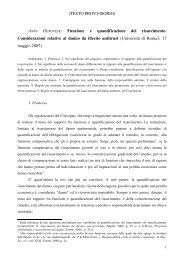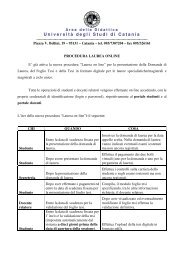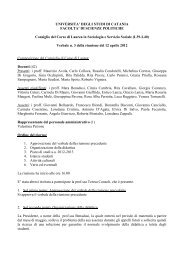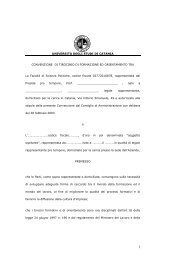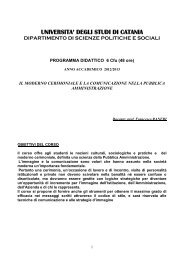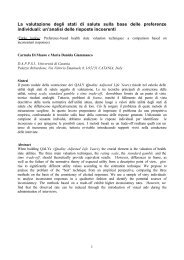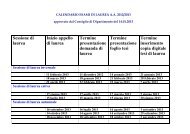(EUBAM) Libya
(EUBAM) Libya
(EUBAM) Libya
Create successful ePaper yourself
Turn your PDF publications into a flip-book with our unique Google optimized e-Paper software.
ReSHAPE Online Papers Series, no. 03/13 – June 2013<br />
General of the Finnish customs service, Antti Hartikainen, was chosen and rapidly deployed in the<br />
theatre.<br />
The current 24-months mission <strong>EUBAM</strong> <strong>Libya</strong> was officially established on 22 May 2013,<br />
through a formal decision by the European Council, with the aim of enhancing the security of<br />
<strong>Libya</strong>’s borders in the short term, and a broader IBM strategy in the long term. On that occasion,<br />
the High Representative Catherine Ashton stressed that "<strong>EUBAM</strong> <strong>Libya</strong> is an important mission for<br />
<strong>Libya</strong> and the entire region, but also for the security of EU borders", concept perfectly in line with<br />
the problematic and complex framework above depicted. She also said that “the mission responds to<br />
a direct request from our <strong>Libya</strong>n partners” and that “it can now be deployed in June”. 8<br />
The mission should be endowed with approximately 110 staff and a budget of € 30,3 million<br />
for the first 12 months (the mission should last 24 months). The mission will deploy gradually<br />
taking due account of the political and security situation as well as the local needs. As the mission<br />
should entail a transfer of know-how, the 165 staff (at full operational capability) will be made by<br />
the head of mission, 83 seconded staff, 27 international staff and 54 locally-recruited staff.<br />
From words to deeds: critical aspects<br />
The Headquarters of the Mission will be based in Tripoli, in the North of the country; not in<br />
the South as originally planned since the main areas tackled like the lack of security in the borders<br />
due to arms and drugs trafficking and uncontrolled migrations are concentrated in southern <strong>Libya</strong>.<br />
However, it could not be considered a determinant factor, though it remains an influent one,<br />
because the main task of the experts is to provide medium and long term recommendations for<br />
secure border management to help <strong>Libya</strong>n authorities in strengthening border control capacity and<br />
defining a national integrated Border Management strategy.<br />
On the other hand, the location of the Headquarters points out the short-term priority of the<br />
EU in securing itself by prioritizing the Mediterranean coast. Actually, even if the situation in the<br />
Sahel region is more stable than it was in past months, this area remains an hotbed for criminal<br />
organizations and illegal traffics. On the long term, then, the EU’s perspective should be narrow,<br />
because the problems of the South could infringe the Union’s interests, especially in the long-run.<br />
Furthermore, the comprehensive approach the EU would implement has to take in due<br />
consideration the dynamics of the entire region, the interdependencies of the local countries, not<br />
only in term of South-South migration but also concerning illegal trafficking and criminal<br />
organizations.<br />
The challenge the EU is going to face is huge though cooperation on migration control and<br />
border management is an area well known to the EU due to its past activities in this field. However,<br />
in addition to some inconsistency and political ambivalence, another weakness is lack of linearity in<br />
as much as the EU seems not so much committed to decisive actions towards Disarmament,<br />
Demobilization and Reintegration (DDR) and towards the Security Sector Reform (SSR). Both<br />
DDR and SSR are naturally part of the EU’s response to the situation in <strong>Libya</strong>. They are managed<br />
by the EU Delegation in Tripoli. After several months, the new Head of the delegation, Nataliya<br />
Apostolova, has been appointed on 21 May 2013. She has an enormous amount of programmes and<br />
funds to manage but a small staff and scarce organization resources. This could represent a critical<br />
point for the effectiveness of the mission in a wider perspective: “financial aid administered through<br />
a three persons-strong EU Delegation in Tripoli is likely to quite insufficient to achieve the goal of<br />
building a democratic, stable and prosperous country” (Hatzigeorgopoulos and Fara-<br />
Andrianarijaona, 2013: 13).<br />
8 Green light for civilian mission to support border security in <strong>Libya</strong> (22 May 2013), Council of the European<br />
Union, Brussels, 9478/13, Press 189 in<br />
http://www.consilium.europa.eu/uedocs/cms_data/docs/pressdata/EN/foraff/137189.pdf<br />
Francesca Arcidiacono, EU Border Assistance Mission (<strong>EUBAM</strong>) <strong>Libya</strong>: Testing EU Actorness - 6



